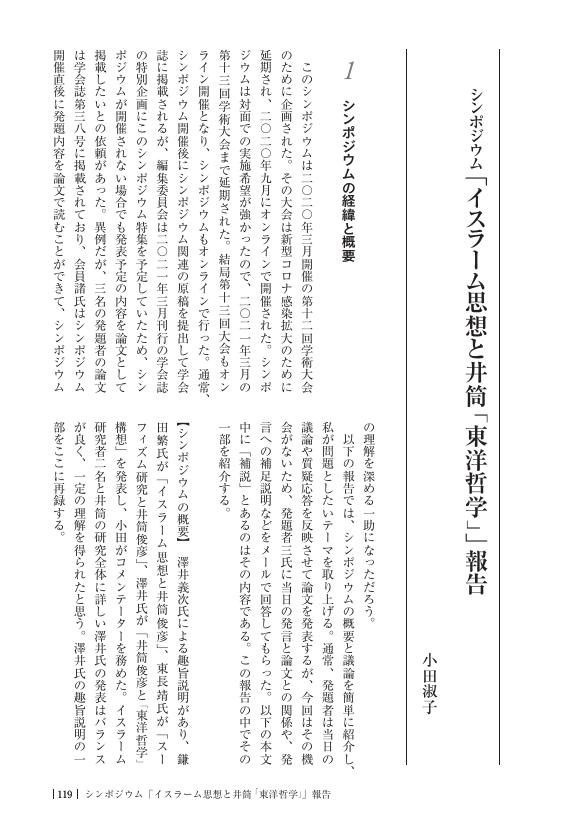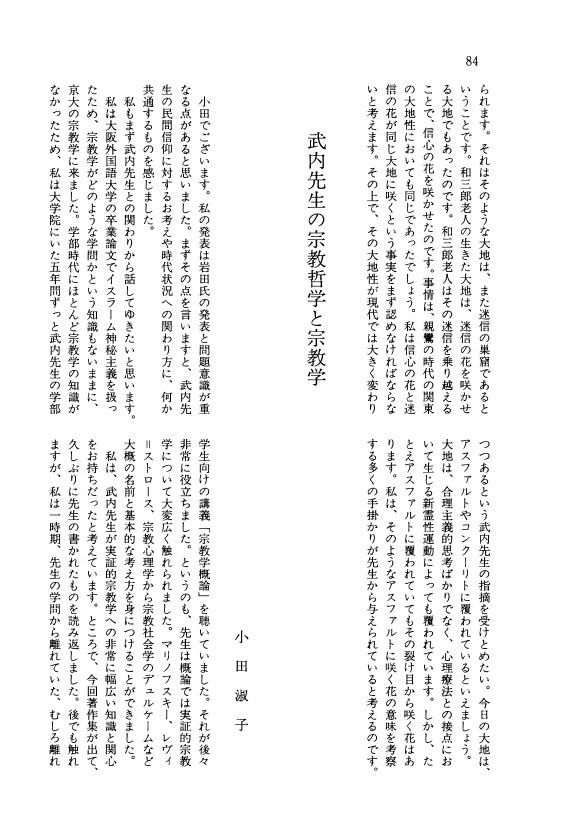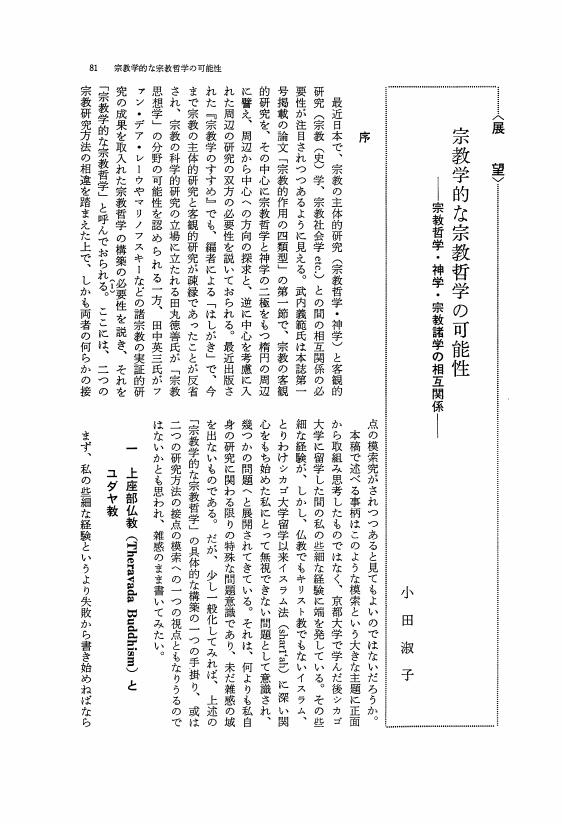2 0 0 0 OA シャリーアの救済論的意味
- 著者
- 小田 淑子
- 出版者
- 宗教哲学会
- 雑誌
- 宗教哲学研究 (ISSN:02897105)
- 巻号頁・発行日
- vol.8, pp.36-51, 1991 (Released:2018-03-21)
The literal meaning of the Sharî‘ah, usually rendered as Islamic law, is the Path which God ordained for believers. This spiritual Path became highly articulated into various rules, such as ritual, moral and even legal rules, in the course of the early Islamic history. This article intends to elucidate the soteriological meaning of the Sharî‘ah in Islam. This is primarily clarified in relation to the basic soteriology exposed in the Qur’ân. The concept of faith in the Qur’ân means to be guided by God to the Path in this world till the Day of Resurrection in the future, rather than the liberation from the original sin done in the mythical past. The other concept, ummah,is the crucial key-term to understand the reason for the precise articulation of the Path. Being a genuine religious community, it never leaves out the socio-political sphere necessary for human life, where Muslims raise their family and live by economic activities. A believer who is, as the solitary one, faced with God cannot but live in, and also is responsible for, the Ummah in this world. Therefore, the Path necessarily contains many social rules. Among several types of the Qur’anic discourses, the narrative of the eschatology most impressively reminds man of the transcendent dimension where man is ever faced with God. It is the fear of the eschatological Judgment that makes man realize both the vanity of this-worldly life and the true significance of his temporary action, making man aware of his own sins. And God forgives man who repents. The Qur’ân keenly and concretely points out man’s intrinsic weakness or propensity to evil in the fact that man does not only commit sins but often evades selfawareness of his sins. God sets the Sharî‘ah for fallible Muslims to live in the Ummah. Without the sharî‘ah, the Ummah could not be maintained, and hence Muslims could not exist in history in a full sense. For the Sharî‘ah may remind Muslims of God at every moment of action, and bring them back from forgetfulness of God to faith.
2 0 0 0 OA 宗教共同体の哲学的考察(第一部会,<特集>第六十八回学術大会紀要)
- 著者
- 小田 淑子
- 出版者
- 日本宗教学会
- 雑誌
- 宗教研究 (ISSN:03873293)
- 巻号頁・発行日
- vol.83, no.4, pp.1311-1312, 2010-03-30
- 著者
- 小田 淑子
- 出版者
- 京都大学大学院アジア・アフリカ地域研究研究科附属イスラーム地域研究センター
- 雑誌
- イスラーム世界研究 : Kyoto Bulletin of Islamic Area Studies (ISSN:18818323)
- 巻号頁・発行日
- vol.7, pp.541-544, 2014-03-14
1 0 0 0 OA ルーミーにおける fana' と baqa'
- 著者
- 小田 淑子
- 出版者
- 一般社団法人 日本オリエント学会
- 雑誌
- オリエント (ISSN:00305219)
- 巻号頁・発行日
- vol.20, no.1, pp.79-94,268, 1977-09-30 (Released:2010-03-12)
Fana' and baqa' are two of the most important technical terms in Sufism. Fana' is generally defined as “dying to one's selfish ego (nafs)”, and baqa' as “surviving by receiving the divine Life after fana'”. I would like to elucidate how fana' and baqa' are related to each other in Rumi.In order to attain to fana', it is required to concentrate one's self on God. In this process, the world as that of Multiplicity is regarded as something to renounce. At the moment of fana', God makes one's self die, then there is nothing but God. It is the realization of the Unity of God. However, the symbol of the transformation of a stone into a ruby denotes that the death of the self is immediately the transformation into the fundamental Self. The death of the self, the realization of the Unity of God and the appearance of the Self may take place at the same moment of fana'. I think that fana' is, in principle, or in the most authentic mode, simultaneous with baqa'. But there remains a problem. Though most mystics usually feel intoxicated at the moment of fana', some of them may come to enjoy and anticipate such a mysticll feeling termed “hal”. To remain. in hal may be regarded as the false mode of fana', in the stage of which man affirms his self in a wrong way, in other words, he does not die out. Such a man does not open his eye onto the world.To surpass the false mode of fana' is to become utterly one with God in Love and to enter into the world (baqa'). The return to the world in the attainment of baqa' marks the purest oneness of man with God. Rumi expresses such a pure oneness between God and the man in baqa' by the term of “the One ness with Light” (ittihad-i nur). It implies the two aspects of baqa'; that of the purest oneness between God and man, and that of the so-called “second separation” (farq-i thani). Since one who attains in baqa' has died to his self, baqa' preserves an aspect of fana' in itself. In Rumi, baqa' means twofold; to live the eternal Life, and the survival of the bodily existence. Accordingly, fana' also means two fold; the Non-being of the fundamental Self, and the death of his self. Needless to say, each pair of twofold meanings, respectively, points to the one and same situation.If we consider the relation between fana' and baqa' from the viewpoint of Rumi's idea of “the New Creation” (khalq-i jadid), both terms are closely related to each other not statically but dynamically. Baqa' means, first of all, to live the eternal Life, and the Eternal is ever the Present or at the Moment, therefore, a mystic in baqa' lives the eternal Life at every moment. That would be possible only by dying at every moment (fana'). Moreover, he does realize such a fundamental fact. In regard to the other meaning of baqa', the survival of the bodily existence, it cannot be continuous. It must be the continuity including the discontinuity within itself. Since a mystic in baqa' realizes the discontinuity, he can experience a new “state” or “present” (hal), which is not like that of the day before, every day.
1 0 0 0 OA シンポジウム「イスラーム思想と井筒「東洋哲学」」報告
- 著者
- 小田 淑子
- 出版者
- 宗教哲学会
- 雑誌
- 宗教哲学研究 (ISSN:02897105)
- 巻号頁・発行日
- vol.39, pp.119-132, 2022 (Released:2022-06-05)
1 0 0 0 OA 宗教と法-イスラームの視点から
- 著者
- 小田 淑子
- 出版者
- 日本法哲学会
- 雑誌
- 法哲学年報 (ISSN:03872890)
- 巻号頁・発行日
- vol.2002, pp.44-58, 2003-10-20 (Released:2008-11-17)
- 参考文献数
- 3
1 0 0 0 OA 澤井義次著『シャンカラ派の思想と信仰』
- 著者
- 小田 淑子
- 出版者
- 宗教哲学会
- 雑誌
- 宗教哲学研究 (ISSN:02897105)
- 巻号頁・発行日
- vol.35, pp.122-125, 2018-03-31 (Released:2018-05-11)
1 0 0 0 OA 宗教学的宗教哲学の試み イスラームの宗教性
- 著者
- 小田 淑子
- 出版者
- 宗教哲学会
- 雑誌
- 宗教哲学研究 (ISSN:02897105)
- 巻号頁・発行日
- vol.28, pp.70-74, 2011 (Released:2019-09-18)
1 0 0 0 OA 武内先生の宗教哲学と宗教学
- 著者
- 小田 淑子
- 出版者
- 宗教哲学会
- 雑誌
- 宗教哲学研究 (ISSN:02897105)
- 巻号頁・発行日
- vol.18, pp.84-91, 2001 (Released:2019-03-21)
1 0 0 0 OA 展望:宗教学的な宗教哲学の可能性 宗教哲学・神学・宗教諸学の相互関係
- 著者
- 小田 淑子
- 出版者
- 宗教哲学会
- 雑誌
- 宗教哲学研究 (ISSN:02897105)
- 巻号頁・発行日
- vol.3, pp.81-86, 1986 (Released:2018-03-14)
1 0 0 0 OA ルーミーの宗教思想
- 著者
- 小田 淑子
- 出版者
- 一般社団法人 日本オリエント学会
- 雑誌
- オリエント (ISSN:00305219)
- 巻号頁・発行日
- vol.18, no.1, pp.27-41,159, 1975-08-31 (Released:2010-03-12)
Rumi's religious thought is based on the sufism developed by Ibn 'Arabi. The pivot of his thought is the idea of the union with God. According to his view, it is not the abstract thought separated from reality but the subjective and existential one. It is concerned with what the true and fundamental self of man should be. The idea originates from the Unity of God (tawhid), the basic doctrine of Islam. I think his idea occured when “tawhid” was earnestly and thoroughly sought.God is the only true Being. Beings other than God are nothing but Divine Manifestation (tajalli). The true Unity of God is found, I think, in Divine Act in the eternal Now which Rumi calls the “new creation” (khalq-i jadid). This Unity cannot be known by means of ordinary knowledge. Man can know it when he dies to his self. Dying to his self is “fana'”.Why must he die to self in order to know God? God gives man both body and soul (ruh, jan), the latter of which is one with God. Man is the only creature that is created to know God. Though everyone is created and given life at every moment by God, he separates from God before reaching fana'. It is the separation from God to live without knowing that fundamental fact. This is no other than the sin of man. Forgetting that God is his fundamental (asl), he regards his self as his own. Rumi names this self “nafs”. To regard his self as what is in and by himself is at the same time to set it up against God. That means to rebel against the Unity of God.The awakening of sin makes him a seeker (talib). The seeker must be guided by the master (shaykh, pir) who is one with God, for “nafs” remains in the seeker. The only purpose of this search is to die to his self. So he must make himself lower and lower. God pours his Love on the one who makes himself lower.Dying to self takes place in the very self, but it is not due to man's own act. Only Divine Love can do it. This is fana'. Man can reach the union with God at the moment of fana'. Therefore, the union never means that two kinds of being, God and man, become one by such means as fusion. We must regard Rumi's idea of union as the realization of the Unity of God, where man is dead and only God exists. At the moment of fana' he can know God and find his fundamental self which participates in Divine Act. He can find God nowhere but in his own fundamental (asl), his soul.But fana' is not the final stage. He must pass away from fana'. Passing away from fana' (fana' al-fana') is baqa'. In this stage he can realize the true unitive state. At baqa' he can live the life of his fundamental self and his life is one with Divine's. Rumi expresses this situation as “ham-dami”, which literally means “to participate in breath”. Man's every act participates in Divine Act.






